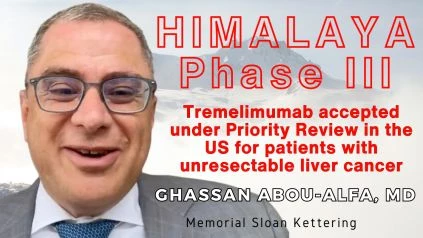Dr. Ghassan Abu Alfa, MD with Memorial Sloan Kettering Cancer Center in New York, provides an update on the key findings of the Himalaya clinical trial. The trial, a phase 3 study, investigated the combination of darvalumab and tremelumab for patients with intractable hepatocellular carcinoma.
The study involved a phase 3 clinical trial, comparing the combination therapy to sorafenib, the prevailing standard care at that time and widely used globally. The primary focus was on enhancing survival outcomes with the combination of Dervalumab and Tremelumab versus Sorafenib.
Notably, the median overall survival was approximately 16.5 months for the combination therapy compared to around 13.5 months for Sorafenib. This substantial clinical and statistical significance led to the approval of the combined regimen, known as the stride regimen in the U.S. and other parts of the world, setting a new standard of care with improved patient outcomes.
Dr. Abu Alfa delves into the importance of long-term follow-up, emphasizing that the concept extends beyond just the Himalaya trial. Long-tail effects are often seen with checkpoint inhibitors, reflecting the time required for T cells to be primed to target cancer cells. This phenomenon is demonstrated in the Himalayan study with continued benefits over time.
The analysis included multiple time points: 12, 18, 36, and even 48 months (4 years), showing consistent improvements in patient outcomes with the Dervalumab and Tremelumab combination. Remarkably, at the 48-month mark, a quarter of patients who received this regimen were still alive, underscoring the value of long-term follow-up and the increasing maturity of data.
Regarding patient demographics, Dr. Abu Alfa highlights the impact of different etiologies on treatment effectiveness. Patients with Hepatitis B, Hepatitis C, and non-viral etiologies may respond differently, with Hepatitis B showing the best outcomes, followed by Hepatitis C and non-viral etiologies. This pattern applies to most checkpoint inhibitors and supports the broader understanding of therapy effects.
Safety concerns are addressed, particularly immune-related adverse events, which were generally manageable. Liver function markers like ALT, AST, and bilirubin saw subtle effects, while bleeding events related to varices were minimal. Dr. Abu Alfa introduces the intriguing concept that patients experiencing immune-related adverse events tend to have improved survival outcomes, indicating the importance of immune system activation.
Comparing the four-year survival rate observed in the Himalaya trial to historical survival rates for advanced liver cancer patients, Dr. Abu Alfa notes the substantial progress in extending survival. The historical median survival of just three months has evolved to around 16 months with combination therapies like Dervalumab and Tremelumab.
Considering other treatment options, Dr. Abu Alfa discusses three combination therapies, two of which are approved, and highlights the nuanced benefits of each, influenced by patient demographics. The choice of therapy is influenced by factors such as patient convenience and quality of life, with Dervalumab and Tremelumab requiring fewer clinic visits due to its dosing schedule.
To conclude, Dr. Abu Alfa provides insight into the mechanisms of action of NTPD1, NTPDL1, and CTLA4, shedding light on the interactions between T cells and cancer cells. He reiterates the positive impact of the terminal map, emphasizing its once-in-a-lifetime dosing and its sustained effect on patient survival.
In managing potential immune-related adverse events, Dr. Abu Alfa highlights that these events are relatively minimal and correlated with improved outcomes. The combination therapy, Mfinzi and Imjudo, showcases both survival benefits and the potential link between immune reactions and better patient outcomes.

